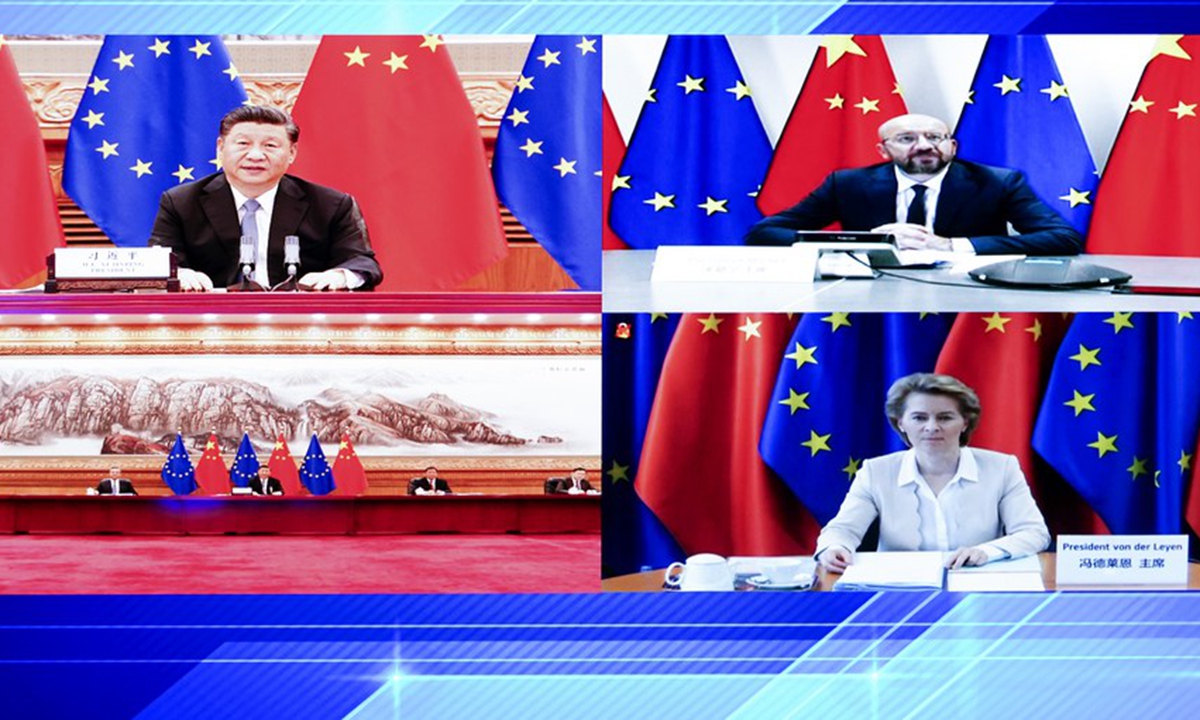EU advised to refrain from 'politically correct' values for China ties
By Chen Qingqing and Leng Shumei Source:Global Times Published: 2020/6/23 21:05:54

Chinese President Xi Jinping meets with President of the European Council Charles Michel and President of the European Commission Ursula von der Leyen via video link in Beijing, capital of China, June 22, 2020. (Xinhua/Yan Yan)
The Europe and China attached greater importance to pragmatic cooperation, despite some Western media described that the EU-China summit on Monday concluded with more differences than consensus. Chinese observers on EU affairs pointed out that EU defending their so-called values by bringing up a number of issues such as Hong Kong, Xinjiang and human rights could be interpreted as building a "spiritual fortress" in the face of China's growing influence.
Though EU Commission President Ursula von der Leyen stressed that it's not possible to shape the world of tomorrow without a strong EU-China partnership, and that the EU is committed to working with China in crucial areas, the EU saw this partnership as "complex" and vital, as the bloc seeks to defend its values, said observers. For instance, on the Hong Kong matter, the EU reiterated its "grave concerns" at steps taken by China to push forward the national security law, and sees those steps "not in conformity" with the Basic Law and China's international commitments.
The EU also raised some concerns over human rights issues in Xinjiang and Tibet, in addition to questions about China's epidemic response and the prosecution of Canadians Michael Kovrig and Michael Spavor.
Some Western media believe that the EU and China sparred not only over geopolitics but also on the economy, while the two sides failed to come up with a joint declaration or joint press conference, which has been interpreted by the likes of the New York Times and Bloomberg that the summit yielded little results.
Europe's policy toward China has always been two-sided: on one hand, the region needs to cooperate with China on economy and globalization; on the other, they remain alert to and feel threatened by the power of a different ideology and development model, Sun Keqin, a research fellow at the China Institutes of Contemporary International Relations, told the Global Times on Tuesday.
Facing growing pressure from the US government, the EU has been forming a more complex view in recent years toward China, which is its largest economic partner, with some lingering concerns over pragmatic issues such as state-owned enterprise investment, market access and ideological differences.
American hawks like Secretary of State Mike Pompeo have been highlighting the urgency for Europe to adopt a hard-line approach toward China, as they consider its rise a potential threat not only to the region's economic interests but also its "way of life."
"It was predictable that Europe voiced those concerns, as even before the summit, some politicians issued a series of statements opposing China's stance for echoing the domestic needs from a political aspect, while taking US pressure into account," Wang Yiwei, director of the Institute of International Affairs at Renmin University of China in Beijing, told the Global Times.
On May 29, the EU issued a statement rejecting China's new national security law for the Hong Kong Special Administrative Region (HKSAR), claiming it seriously undermines the "one country, two systems" principle and high degree of autonomy enjoyed by the HKSAR. The European Parliament also strongly criticized the new law, threatening to sue China at the International Court of Justice when it takes effect, media reported.
However, observers do not believe Europe would take any action toward China, as unlike the US that aims to maintain its global hegemony since World War II, Europe has been sharing a consensus in upholding multilateralism and pursuing mutual interests with China. More importantly, economic issues always top the EU's agenda of dealing with China.
"The EU-China summit is extremely important for the EU as it faces a serious choice which will have major consequences for Europe," John Ross, a senior fellow at the Chongyang Institute for Financial Studies at Renmin University of China, told the Global Times.
In the next two years, economic growth will be far stronger in China than in any other major center of the world economy, and it would be greatly beneficial for the economic recovery of the EU and its economic cooperation with China by concluding key agreements, such as a comprehensive bilateral investment treaty by the end of 2020, and agreeing on reaching a consensus on fair competition rules, he noted.
Criticisms over the so-called human rights issues and affairs of China's Tibet, Xinjiang and Hong Kong always co-exist with bilateral cooperation, which has also become a form of "political correctness" which would have little impact on mainstream interaction between China and the EU, some observers said.
"Cooperation is still the main course for China-Europe relations. That won't change in the future," Sun said.
"Old Europe" is the Chinese way of calling European countries, incorporating certain criticisms of Europe's stereotypes but also some respect, as China has never intended to influence or change Europe by using its own values, a Beijing-based international affairs observer surnamed Huang told the Global Times.
"We don't mind Europeans guarding their 'spiritual fortress' in a stubborn manner. We hope they would come out one day," she said.
However, some observers see the summit as a successful one, especially when the US is seeking to decouple from China on multiple fronts. "We could only see the importance of the EU-China dialogue when it's compared to the US. The most important strategic gain for China is EU won't decouple from China or choose between China and the US," Song Luzheng, a Paris-based Chinese scholar and research fellow at the China Institute of Fudan University, told the Global Times.
Posted in: DIPLOMACY